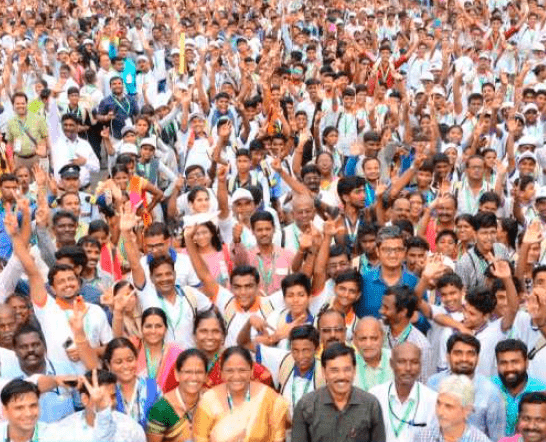Background
At the time of this research study, domestic violence and abuse (DVA) against women was being addressed by HMF through community-based interventions in 37 villages in Lohara and Tuljapur blocks of Dharashiv district of rural Maharashtra (through financial and technical support from SWISSAID). One key intervention was the formation of Nirdhar Groups, meaning ‘committed or determined citizen groups’ consisting of gender sensitive and influential men and women, committed to fostering change.
Purpose of the study
This research aimed to explore the experiences of village-level Nirdhar Groups in:
- developing processes and structures to impact gender discriminatory practices DVA prevention across their local communities;
- identify the issues and challenges they faced;
- identify interventions used to combat gender inequalities in rural communities.
Methodology
Twelve focus group discussions (FGDs) were conducted in 12 randomly selected villages from the pool of 37 villages involved in HMF’s ‘Responsible Partnership’ project in the Tuljapur and Lohara blocks of the Dharashiv (previously Osmanabad) district. Each village had one Nirdhar group with 15 to 20 members. inclduing ASHA (Accredited Social Health Activists) workers, healthcare professionals and police representatives. Informed consent obtained from all participants prior to the FGDs.
The discussions were guided by a semi-structured questionnaire/guide that comprised of open-ended questions such as:
- How was the village-level group formed?
- What training did the group members attend?
- What does gender equality mean to the group members?
- What work does the group undertake in their communities?
- What impact has their work had on the community?
- What should be done to ensure the replication and success of such work elsewhere in Maharashtra/India?
The FGDs were conducted in Marathi (the local language), audio recorded, transcribed, and translated into English for analysis. Each FGD session lasted between 90 and 120 minutes and had an attendance of 8 to 12 members. Participants included both men and women members.
Two independent qualitative researchers conducted the interviews, while two other researchers conducted the data analysis under supervision of an expert.
Analysis followed Braun and Clarke’s six-phase deductive reasoning methodology, focusing on the following themes:
(1) how groups identified problems and worked together to prioritise interventions;
(2) short-term interventions to inform and engage communities; and
(3) long term interventions which reflected an embedded transformation across communities.
Findings/ results
The evaluation highlighted the significant role of Nirdhar Groups in driving local change. Nirdhar members used their own community ‘norms’ and identified the discourse of gender equality, so that they could shape and identify their own transformation priorities. These priorities were consistent across all Nirdhar Groups and focused on access to education and healthcare, misogynistic rituals (e.g. drudgery of women, hysterectomy to increase work productivity), family power dynamics, male dominated legislation, DVA. Women accessed education and healthcare without victimization, and Nirdhar Groups acted as advocates against physical and emotional violence, providing information on legal and economic rights.
Their key interventions included
Creating 'Safe Spaces'
Establishing environments where women could access education and basic healthcare without victimization.
Banning Liquor Sales
Groups applied legal pressure to ban liquor sales in local areas, reducing risks of DVA and health associated with alcohol consumption.
Promoting Men’s Involvement in Household Duties
Encouraging men to participate in cooking, childcare, and home duties to challenge gender norms and reduce discrimination.
Leveraging Media Influences
Enabling women to access global perspectives on gender equality through platforms like WhatsApp, Instagram, and Facebook.
Economic Rights Education
Informing women of their legal and economic rights, including government-driven initiatives like opening bank accounts, home ownership, and schemes.
Preventing Dowry and Child Marriage
Using peer pressure and in-home advice, groups worked to prevent dowry and child marriages, emphasizing the societal benefits.
Celebrating 'Good Citizens'
Recognizing and celebrating individuals who modelled positive gender-equal behaviour and served as community role models – the Samajdaar Jodidaar – Responsible Couples/partners. (HMF’s earlier project on ‘Responsible Partnership’ had resulted in such ‘good citizens’.
Conclusion
Nirdhar Groups used local interventions to address priorities such as safe and equal access to education and healthcare. They offered education to address financial oppression and used community pressure and ‘Responsible Couples’ (Samajdaar jodidaar) as mechanisms for change, to instil ‘fairness, gender equality, kind and compassionate community values’ and a variety of techniques to reduce DVA. The drivers for change included role modelling, empowerment of women in communities and a focus on changing cultural practices for present and future generations.
The study reveals the profound impact of community gender equality groups such as Nirdhar Groups. They provide a platform for women to address gender issues and create practical change, such as DVA prevention services and solutions to economic disparity. They raise awareness among men and empower women, contributing to safer and more equitable environments. These groups serve as positive role models for the younger generation, and replicating this model is recommended to extend their benefits. Additionally, the study underscores the importance of integrating gender education with welfare programs to address the needs of poor and marginalized families, further promoting gender equality at both the family and community levels.
The Research Team
Dr Pavel Ovseiko, Radcliffe Department of Medicine, University of Oxford, Oxford, OX3 9DU, UK
Dr Pratyush Kabra, Department of Community Medicine, Ashwini Rural Medical College, Hospital and Research Centre, Solapur, Maharashtra, India, 413006
Ms Sneha Giridhari, SWISSAID, Pune, Maharashtra, India, 411040
Dr Kranti Rayamane, Halo Medical Foundation, Andur, Osmanabad, Maharashtra, India, 413603
Dr Clare Whitfield, Faculty of Health Sciences, University of Hull, Hull, HU6 7RX, UK
Dr Parveen Ali, School of Nursing and Midwifery, University of Sheffield, Sheffield, S10 2LA, UK
Funding support
HMF’s gender equality work implemented in Maharashtra state of India receives a dedicated financial support from the SWISSAID, Switzerland, and the project is monitored by SWISSAID’s India liaison office.
The DEVELOP project was supported by the University of Hull, UK through the Global Challenges Research Fund (GCRF) scheme.
